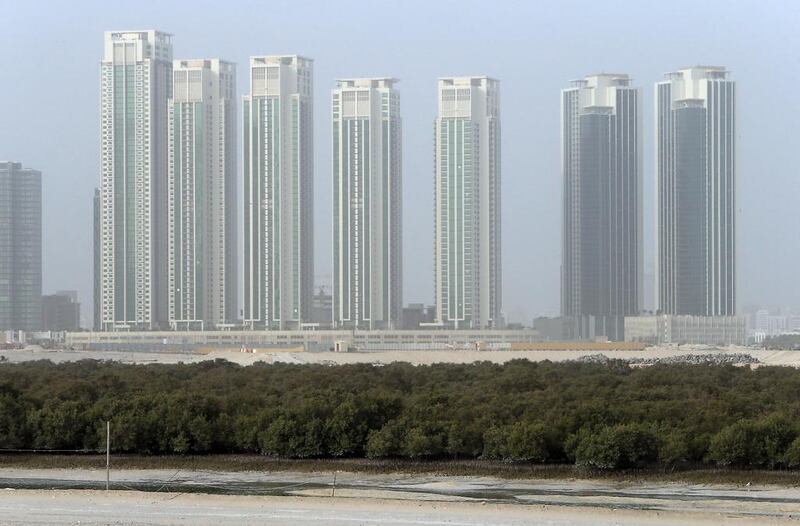Housing rents in Abu Dhabi's newest neighbourhoods rose by more than a seventh in 2013, housing analysts estimate, as tenants in the capital braced for the effects of the government's decision to remove a rent cap.
According to new figures set to be published next week by Jones Lang LaSalle and data published yesterday by the website propertyfinder.ae, rents in the most popular parts of the city increased by an average of 16.7 per cent last year.
Jones Lang LaSalle, which is set to publish its housing data next week, reported that the average annual rent for a selection of two-bedroom apartments it monitors in the capital increased from Dh120,000 at the start of the year to Dh130,000 in the second quarter and then to Dh140,000 in the final three months of 2013.
Meanwhile propertyfinder.ae, which annually lists more than 270,000 properties across the country, reported that the average asking rents for all categories of homes it advertised in the areas of Reem Island, Khalifa City, Al Reef, Al Raha Beach and Khalidiya also increased by 16.7 per cent over the period, with a two-bedroom apartment in Khalidiya now costing an annual rent of Dh124,769.
The website’s listings showed big variations in asking rents across the city’s neighbourhoods.
The highest increases in asking rents were reported for two-bedroom apartments on Reem Island which rose by a surprising 58 per cent over the year from Dh131,424 a year to Dh208,445. At the same time, asking rents for studio apartments in Khalidiya rose by 59 per cent over the period from Dh47,000 to Dh75,000.
The property portal cautioned that both sets of rent increases could be because of statistical anomalies. Studio flats have comprised a small proportion of property stock in the city and during the 12 months the number of homes available on Reem Island has increased significantly, with new luxury developments being completed at Gate Towers and Mangrove Place.
On Reem Island, which was the website’s most searched for neighbourhood in Abu Dhabi last year, clocking up 18.4 per cent of all Abu Dhabi property views on propertyfinder.ae, asking rents on average rose by 20.8 per cent. Asking rents for studio apartments on the island increased 10 per cent to Dh75,000 and asking rents for one-bedroom apartments rose 7.38 per cent to Dh96,076.
For Khalifa City, which was the second most searched for neighbourhood in the capital during 2013 with 11.3 per cent of the city’s property views, asking rents increased by an average of 23 per cent, researchers found. Asking rents for studio apartments in Khalifa City increased 23 per cent over the year to Dh32,174, while rents for one-bedroom apartments rose 35 per cent to Dh65,274. Two-bedroom apartments also increased 25 per cent to Dh117,864.
Property experts started to report rent increases in Abu Dhabi’s newest neighbourhoods last year as the city was able to capitalise on rent increases in Dubai and a new decree requiring all Abu Dhabi government employees to reside in the capital. However, rents in older neighbourhoods are expected to remain stable or fall.
According to the property agent Cluttons, average rents in the city rose 4.5 per cent during the second quarter of the year and then by another 1 per cent during the third quarter.
A decision at the end of last year to rescind a rule limiting the amount landlords were allowed to put up rents for existing tenants to 5 per cent, is also expected to result in further rent increases this year.
“Rents in Abu Dhabi are still going up and we expect that trend to continue in 2014,” said Craig Plumb, the head of research at Jones Lang LaSalle’s Dubai office. “We can’t definitively say whether that is due to the removal of the rent cap or not yet but the fact that rents appear to have increased significantly in the final quarter of the year could be down to the government decree coming into force.”
He added that the average increase of 16.7 per cent was slightly less than that the agency had reported in Dubai, where average rents for two-bedroom apartments increased by 18 per cent over the same period.
“It is still probably too early to see what the effect of removing the rent cap is having on rents in Abu Dhabi,” said Michael Lahyani, the chief executive and founder of propertyfinder.ae. “Over the course of the year we expect to see rents in the prime areas continue to increase, while rents in the sub prime areas of the city will stabilise as the market continues to recover.”
lbarnard@thenational.ae





